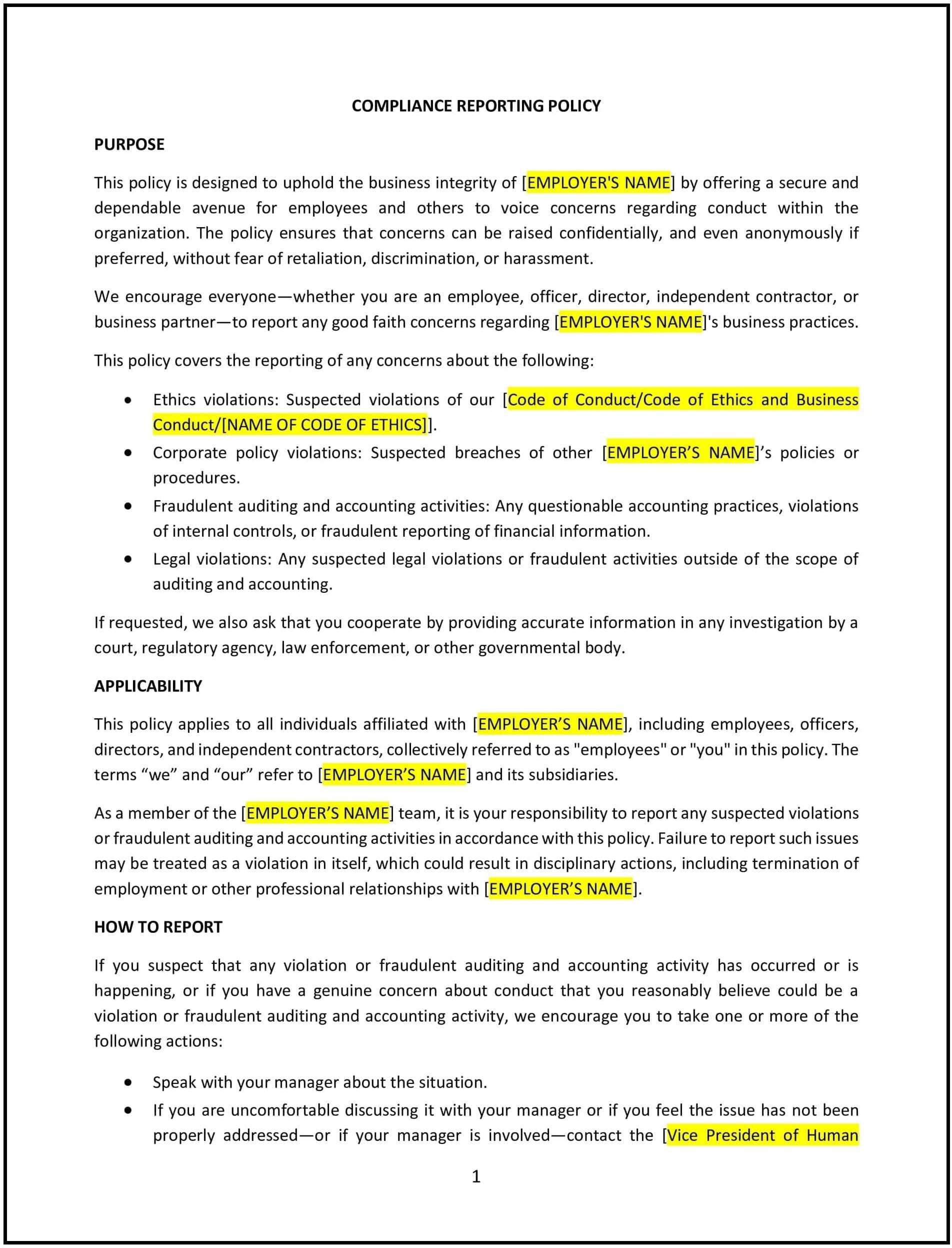Compliance reporting policy (Nevada): Free template
Got contracts to review? While you're here for policies, let Cobrief make contract review effortless—start your free review now.

Customize this template for free
Compliance reporting policy (Nevada)
This compliance reporting policy is designed to help Nevada businesses establish a clear and structured approach to reporting compliance-related issues, ensuring that employees can report violations or concerns without fear of retaliation. The policy outlines the process for reporting compliance violations, including breaches of laws, regulations, or company policies.
By adopting this policy, businesses can promote a culture of integrity, accountability, and transparency while ensuring that compliance risks are identified and addressed in a timely manner.
How to use this compliance reporting policy (Nevada)
- Define compliance violations: Clearly outline what constitutes a compliance violation, including breaches of legal, regulatory, or company policies.
- Establish reporting procedures: Specify the steps employees should take to report compliance concerns, including whether they should report to their supervisor, HR, or a designated compliance officer.
- Offer multiple reporting channels: Provide employees with various ways to report compliance issues, such as through an anonymous hotline, email, or in-person meetings.
- Ensure confidentiality: Emphasize that reports will be treated confidentially and that employees’ identities will be protected to the extent possible.
- Address non-retaliation: Make it clear that employees who report compliance violations in good faith will not face retaliation or adverse actions.
- Define the investigation process: Outline the process the company will follow to investigate compliance concerns, including timelines, who will conduct the investigation, and how employees will be kept informed.
- Clarify consequences of retaliation: Define the disciplinary actions that will be taken if employees engage in retaliatory actions against those who report violations.
- Provide training: Ensure that employees receive regular training on the importance of compliance and the proper procedures for reporting concerns.
Benefits of using this compliance reporting policy (Nevada)
This policy provides several key benefits for Nevada businesses:
- Promotes transparency: Encourages employees to report compliance violations, contributing to a more transparent workplace.
- Reduces legal risk: By addressing compliance concerns promptly, businesses can reduce the risk of legal, financial, or reputational harm.
- Encourages ethical behavior: Establishes a clear process for employees to report unethical conduct, helping to maintain a culture of integrity and accountability.
- Protects employees: Safeguards employees from retaliation for reporting compliance concerns, promoting trust in the reporting process.
- Supports regulatory compliance: Helps businesses adhere to legal and regulatory requirements by ensuring that compliance issues are reported and addressed.
Tips for using this compliance reporting policy (Nevada)
- Communicate the policy clearly: Ensure that all employees are aware of the compliance reporting policy, how to report issues, and that they know there will be no retaliation for doing so.
- Ensure accessibility: Make the reporting channels easily accessible to all employees and ensure they know where to find the policy and how to use the reporting tools.
- Encourage a speak-up culture: Foster a work environment where employees feel empowered to report compliance violations and are encouraged to do so without fear of consequences.
- Maintain clear documentation: Keep detailed records of all reports, investigations, and resolutions to demonstrate the company’s commitment to compliance and to meet regulatory requirements.
- Review the policy regularly: Periodically review and update the policy to ensure it remains aligned with company practices and changes in Nevada laws or industry standards.